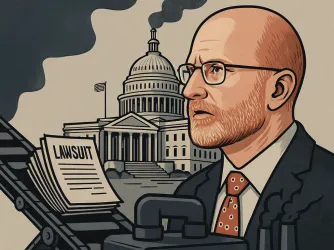Table of Contents
Dixie State faces legislative scrutiny after attempting to terminate professor

Dixie State University is starting to feel the heat for undermining academic freedom. Right now, the Utah State Senate, the American Association of University Professors, and Dixie State’s own faculty are speaking out in support of former tenured professor Ken Peterson, whose mistreatment by the university administration has become a rallying cry for protecting academic freedom and due process on the campus.
FIRE reported on Peterson’s case last month, and John K. Wilson at the American Association of University Professors’ Academe blog has covered the case extensively. In brief, Dixie State issued termination notices to Peterson and fellow professor Glenn Webb last July. Though the Dixie State administration brought multiple accusations against Peterson, the crux of the case against him seems to be the accusation that he disclosed confidential information on the unsuccessful tenure vote of another member of the faculty, Mark Houser, in violation of Dixie State’s confidentiality policy — a policy that Wilson rightly calls “one of the most extreme in academia.” Peterson is also questionably accused of “slander[ing]” Houser and Dixie State President Richard Williams.
In the process of seeking to terminate Peterson, Dixie State violated a host of the procedural safeguards that the university itself had established. As Wilson reports, Dixie State claimed in a press release that Peterson and Webb were in an “appeal process” when they had not yet been found guilty of anything; suspended Peterson from campus, a draconian sanction given that there was no evidence Peterson would be a physical threat; and, for many accusations, did not state what policy Peterson had allegedly violated. Moreover, the termination letter failed to disclose what evidence led the administration to believe that Peterson even made the remarks at issue.
These are just some of the procedural problems in Peterson’s termination. Regardless, had Peterson said the alleged remarks, he would have almost certainly been protected by the First Amendment as a tenured professor at a public university.
Peterson received good news, however, when both the faculty review board and the Utah System of Higher Education recommended that he be reinstated. Dixie State said that it “wholeheartedly support[ed] this decision.”
There was just one catch.
Dixie State constructed an absurd “Last Chance Agreement.” In order to return to his position, as had been recommended twice-over, Peterson would have to agree not to “engage in any conduct that will damage, undermine, or sabotage” a host of DSU programs, “make unfounded or untruthful derogatory statements about Dixie State,” make “unfounded derogatory or untruthful statements about Dixie State” on social media, or “engage in any aggressive interpersonal encounters.” He would have to agree to be “excluded from all disciplinary, tenure, and promotion committees,” to cease unidentified “unprofessional behaviors,” and “accept” that his work would be “monitored and supervised by the Dean of the College of Arts.”
The Last Chance Agreement, like Peterson’s termination letter, sets forth unconstitutionally vague and overbroad restrictions on the rights of a tenured professor at a public university to express himself. It would be constitutionally unsound even if it had been reached through a defensible process — which it had not.
Circulating now is a document titled “DSU Faculty Call to Action,” created and distributed by “Concerned members of the DSU faculty.” The crux of the document’s argument is this: Dixie State policy “does not provide for any modification of the Faculty Review Board’s recommendation, except perhaps as negotiated with and approved by the Faculty Review Board.” That means that the Last Chance Agreement presented to Peterson “should be declared null and void” because it imposes conditions on Peterson’s return that the faculty itself did not recommend or agree to.
The Call to Action incorporates language from a letter that the American Association of University Professors had sent to Dixie State, expressing essentially the same point. That letter argues that “the sanctions against Professor Peterson, listed in the ‘Last Chance Agreement,’ plainly constitute severe sanctions and should not have been imposed without the administration’s having afforded him the requisite protections of academic due process.”
The letter’s writers also criticize the state of academic at freedom at Dixie State more generally, citing acts of “unreasonable intimidation, investigation, suspension, termination, lack of due process, or some combination thereof” on colleagues over the years. As a result, faculty members “fear that our own minor policy violations or poorly worded phrases will result in significant discipline.” Those behind the Call to Action intend to bring the document before the faculty on September 27 and suggest some concrete proposals to reinforce academic freedom at Dixie State.
These proposals include a call that Dixie State’s administration rescind the Last Chance Agreement and, going forward, afford Peterson and Webb all of the procedural safeguards to which they are entitled. Second, the letter proposes the creation of a new faculty committee dedicated to “reviewing recent administrative actions regarding faculty discipline and tenure, and [tasked] with reviewing the adequacy of current policies regarding the safeguarding of faculty rights and due process.”
This last proposal dovetails with that of another interested party: the Utah State Senate. This week, members of the State Senate requested a “performance audit” that would “examine compliance with DSU’s internal policies on employee terminations.” The request specifically cites Peterson’s treatment by the Dixie State administration, and laments that DSU’s administration “has hidden behind University policies in order to punish dissent and undermine academic independence.” FIRE has learned that the audit has been prioritized and that the Legislative Auditor General will be taking the first step of sending an auditor to Dixie State for initial review. Dependent on the finding, Dixie State might be recommended for a full audit.
We’ll stay tuned.
Recent Articles
Get the latest free speech news and analysis from FIRE.

Inside the Trump administration’s extortion-industrial complex

In Philly, a new generation finds its voice — and the tools to defend it

Say it with a song
